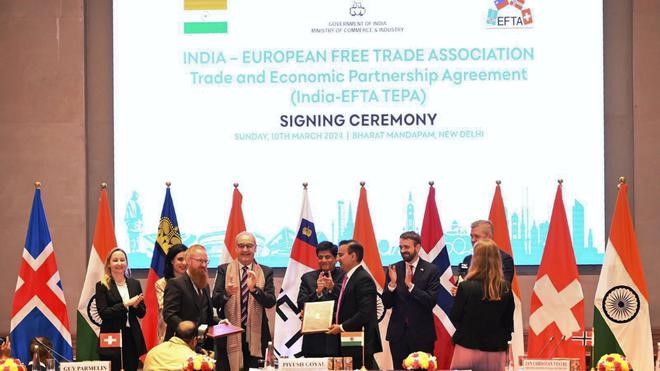
Trade and Economic Partnership Agreement (TEPA)

20.03.2024
Trade and Economic Partnership Agreement (TEPA)
|
For Prelims: Features of India-EFTA Trade and Economic Partnership Agreement (TEPA),Key Points |
Why in the news?
Recently,India and the European Free Trade Association (EFTA) signed a Trade and Economic Partnership Agreement (TEPA) in New Delhi.
Key Points
- The India-EFTA Trade and Economic Partnership Agreement (TEPA) is the latest in India’s recent Free Trade Agreements (FTAs) which ventures into some uncharted territory.
- The India-EFTA Trade and Economic Partnership Agreement (TEPA) aims to boost trade and investment between India and EFTA members Switzerland, Norway, Iceland, and Liechtenstein.
Features of India-EFTA Trade and Economic Partnership Agreement (TEPA)
- Investment: TEPA sets out a target of a $100 billion investment into India from EFTA countries and consequent one million jobs over a 15-year period.
- It also provides India the ability to withdraw its tariff concessions if such expected investment is not achieved. If India is not satisfied, it can pull back its tariff concessions in a proportionate manner after 18 years.
- Trade in goods: India is mandated to eliminate tariffs on most products within seven to 10 years.
- With regard to India’s exports to EFTA, there will be no material impact since most products face very low or zero tariff for nations which have the Most Favored Nation (MFN) status in EFTA countries.
- Trade in services: On services, both India and the EFTA members have committed to liberalization across a wide range of sectors.
- Sustainable development: TEPA's chapter on Trade and Sustainable Development (TSD), comprising commitments on environment and labour aspects, represents a first for India in any FTA.
- Intellectual property rights: the EFTA countries are home to several pharmaceutical and high technology MNCs, whose task has been commitments on protection of intellectual property rights that exceed the WTO’s Trade-Related Aspects of Intellectual Property Rights (TRIPS) Agreement.
- The TEPA’s IPR Annex requires swift rejection of “prima facie unfounded” oppositions. This potentially opens up India’s internal regulatory process to external scrutiny on whether this standard was met.
Source: The Hindu